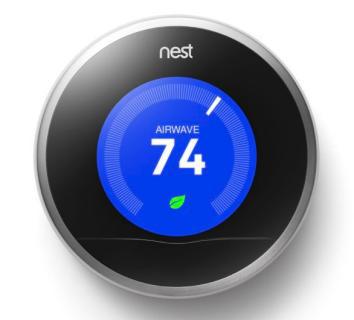Google just announced that it’s buying Nest for $3.2 billion, in the highest-profile tech acquisition of the young year.
Nest is best known for its smart thermostat, which learns your habits over time and adjusts your heat settings accordingly. More broadly, the startup appeared well-positioned to build a platform for other Internet-connected devices in the home.
From Google’s statement:
Nest’s mission is to reinvent unloved but important devices in the home such as thermostats and smoke alarms. Since its launch in 2011, the Nest Learning Thermostat has been a consistent best seller—and the recently launched Protect (Smoke + CO Alarm) has had rave reviews.
Larry Page, CEO of Google, said: “Nest’s founders, Tony Fadell and Matt Rogers, have built a tremendous team that we are excited to welcome into the Google family. They’re already delivering amazing products you can buy right now–thermostats that save energy and smoke/CO alarms that can help keep your family safe. We are excited to bring great experiences to more homes in more countries and fulfill their dreams!”
Tony Fadell, CEO of Nest, said: “We’re thrilled to join Google. With their support, Nest will be even better placed to build simple, thoughtful devices that make life easier at home, and that have a positive impact on the world.”
Nest will continue to operate under the leadership of Tony Fadell and with its own distinct brand identity. The transaction is subject to customary closing conditions, including the receipt of regulatory approvals in the US. It is expected to close in the next few months.
For Google, this continues a big new push to apply its machine-learning expertise to physical objects, from self-driving cars to robots and now home appliances. Once a search company, Google has been broadening its focus over the years to artificial intelligence and machine learning in myriad forms. It’s probably best thought of at this point as a machine-learning company. That is, its goal is to imbue machines with the ability to respond and adapt themselves to human behaviors and environments, so that machines become not only more personalized, but fundamentally more human-like.
The acquisition of Nest implies that Google sees the home, along with the car and the smartphone, as one of the primary frontiers for this project. The end goal would be a home that gets to know you better the more you use it—not entirely unlike the vision of the automated home that you saw in The Jetsons.
It’s an exciting notion, and in some ways a scary one. Perhaps fortunately, it’s also probably many years away from reality.
More on Nest:
- Farhad Manjoo Calls It “the World’s Best Thermostat”
- The Thermostat Wars: How Honeywell Could Beat Nest
More on Google’s forays into robots and machine learning:
